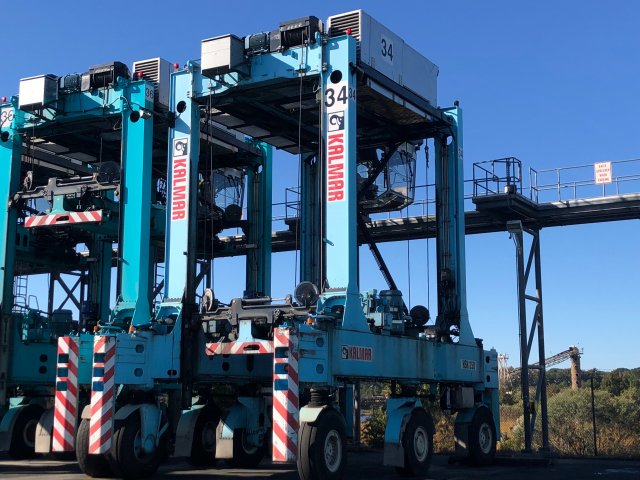Virginia Port Authority Hybrid Shuttle Carriers Reduce Costs and Air Emissions
Overview
As part of the Virginia Port Authority (VPA) efforts to explore ways to reduce fuel consumption and cut air emissions from cargo handling equipment, the VPA replaced several aging diesel cargo handling vehicles with diesel-electric hybrid pieces. VPA partnered with Virginia International Terminals, LLC (VIT) to scrap some of their old diesel-powered cargo handling equipment and replace it with diesel-electric hybrid equipment. EPA funding supported these replacements.
Project
In 2013, EPA awarded $750,000 to the VPA under a Diesel Emissions Reduction Act (DERA) grant to replace diesel cargo handling equipment with hybrid diesel-electric equipment. The port used the grant to replace three Tier I shuttle carriers, used for loading, unloading, and transporting containerized cargo, with Tier IV diesel-electric shuttle carriers three to five years ahead of schedule.
The DERA Grant Program provides incentive funding for projects focused on reducing diesel emissions from old heavy-duty diesel engines that do not meet the newest highway and nonroad engine emission standards. Since 2008, a total of 140 clean diesel grants have been awarded to port specific projects, totaling $138 million. An additional $56 million was awarded through the DERA to multi-sector projects that involve ports.

Several stakeholders partnered with VPA and VIT to promote the project and to share information about benefits and considerations for hybrid cargo handling technology. Promotion was through social and conventional media, websites, and presentations at local, regional and national events. Stakeholders asked to help with promotion included the American Association of Port Authorities, the Coalition for Responsible Transportation, Virginia Clean Cities Coalition, the Institute for Energy and Environmental Research at James Madison University, the Virginia Maritime Association, Virginia Department of Environmental Quality, and the Environmental Defense Fund.
Outcomes
The new shuttle carriers are cleaner, quieter, and more fuel efficient. Project outcomes include:
- Reduced NOx and PM emissions by over 95 percent;
- Eliminated an estimated 7.15 tons of nitrogen oxides (NOx) and 0.78 tons of particulate matter (PM) per year;
- Reduced carbon dioxide (CO2) by 2,270 tons annually;
- Saved 17,382 gallons of fuel per year, which resulted in an annual cost savings of $67,789;
- Improved quality of life for the residents in surrounding communities through the the reduction of noise and emissions;
- Lowered preventive maintenance and associated costs since hybrid engines do not run for the full duration of operation; and
- Reduced use of hydraulic fluid, which limits the occurrence of spills or leaks and reduces the potential for contaminants to enter the environment.
Introduction of the hybrid shuttle carriers combined with other efficiency improvements throughout the port have resulted in fewer cargo moves and shorter routes between moves. The changes have reduced operating hours for the new shuttle carriers when compared with the older equipment.
Lessons Learned
The VPA learned that some of the hybrid machine parts were not compatible with those of the typical diesel machine, and this kept the machine out of operation when maintenance was needed while waiting for parts. As a result, the VPA implemented a process to keep specific hybrid components in stock as part of the regular inventory.
Through the GO Program and other project partners, information regarding successful projects like this can be shared with communities and other port industry stakeholders. This outreach helped demonstrate value not only in air quality improvements and cost savings, but in strengthening relationships with neighboring communities.
Next Steps
The VPA’s goal in this project was to replace aging equipment with newer, cleaner vehicles, while demonstrating to stakeholders and the community that hybrid technology is a viable alternative to diesel-only fleets. This project was the first deployment of this technology on the U.S. East Coast. VPA received additional DERA funding in 2017 to replace another nine diesel shuttle carriers with hybrid powered shuttle carriers (planned for deployment in the fall of 2018).
The Port of Virginia is continuing efforts to introduce quieter, cleaner, and more efficient cargo handling equipment at Virginia International Gateway and Norfolk International Terminals by replacing diesel-fueled gantry cranes with electric rail mounted gantry cranes.
